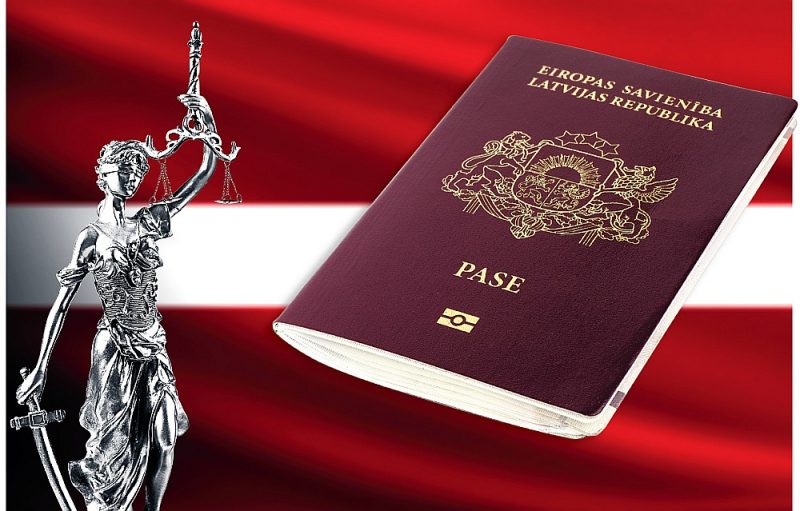
Substantiating the necessity of amendments to the law, the Ministry of Justice has indicated that a citizen of Latvia, exercising his or her rights as a citizen contrary to the interests of Latvia, may cause significant damage to Latvia’s national security and constitutional order.
Foto: Osman Bugra Nuvasil um Stoatphoto/SHUTTERSTOCK
Māra Libeka, “Latvijas Avīze”, JSC “Latvijas Mediji”
–
“Today we heard very positive news” – Rajev summarizes Wednesday’s highlights in Ukraine
–
Has Ukraine declared war on Russia? – a question that can confuse even Rajev
–
Willow on gas sales: I think the problem for the Russians has already begun
Today, the Saeima will decide on amendments to the Citizenship Law, which are being implemented as a matter of urgency and will provide a legal basis for depriving those who support war crimes of Latvian citizenship. These amendments to the law have been initiated by the Minister of Justice, Jānis Bordāns (“Conservatives”), and have already been assessed by the Parliamentary Committee on Defense, Home Affairs and the Prevention of Corruption.
The amendments to the Citizenship Law proposed by the Ministry of Justice (MoJ) provide for the deprivation of Latvian citizenship to “persons who have provided significant financial, material, propaganda, technological or other support to persons, states or other entities who have committed acts, including crimes against peace, genocide , crimes against humanity, war crimes that undermine or threaten the territorial integrity, sovereignty and independence of democratic states or the constitutional order ‘.
However, the amendments to the law state that in the event of deprivation of citizenship, a person may not become stateless, as required by the International Convention on the Reduction of Statelessness and the Universal Declaration of Human Rights.
Does this mean that the amendments to the law will only affect those who have dual citizenship, but will not apply to those who glorify military aggression and internationally punishable crimes who only have Latvian citizenship?
Juris Rancāns (“Conservatives”), Chairman of the Committee on Defense, Home Affairs and the Prevention of Corruption, confirmed that this is exactly the case – Latvia must not disregard international obligations that prevent it from becoming stateless as a result of deprivation of citizenship.
“In this case, only if a person has dual citizenship can Latvian citizenship be revoked,” said Rancāns. Thus, for example, Tatiana Ždanoka (Latvian Russian Union), a member of the European Parliament representing Latvia, who did not support the EP resolution against Russian aggression in Ukraine, cannot be deprived of her citizenship because she, who has lived in Latvia all her life, is unlikely to have dual citizenship.
Contacting Ždanoka, I found out that she has only Latvian citizenship. It should be noted that Ms Ždanoka was forced to leave the EP’s Group of the Greens / European Free Alliance this week because she “found cardinal contradictions in her approach and assessment of the situation” when she discussed the motives for voting with the Green Group. Zhdanoka has also supported the annexation of Crimea and the war in Syria.
In the first days of Russia’s invasion of Ukraine, Minister of Justice Bordan revealed that the ministry was looking for a solution to deprive Pyotr Aven of Latvian citizenship, who is a co-owner of Russia’s sanctioned Alfa Bank and is considered close to the Russian president. Bordan emphasized that this had to be done legally, and shortly after the announcement, TM submitted the bill to parliament. Aven has both Latvian and Russian citizenship.
The Citizenship Law currently lists four grounds for deprivation of Latvian citizenship. All of them are related to the violations that a citizen commits in relation to his or her country and thus undermines the principle of mutual loyalty between the State of Latvia and this citizen. The current Citizenship Law does not provide for such a ground for deprivation of citizenship, which would be related to violations of generally recognized international law against another democratic state and which would at the same time create an indirect threat to Latvia’s democratic system and constitutional values.
“It must be taken into account that a person must not be deprived of the citizenship of any country. But if he is loyal to another country, then he has the free right to choose the citizenship of that country, ”explained Ieva Miluna, a lecturer in international law at the Riga Graduate School of Law, adding that in this case citizenship is not granted immediately, the process will depend on how the person will be able to integrate in the country concerned.
If a person does not have dual citizenship, then there must be a transition period from the moment the decision to revoke citizenship and grant citizenship to another country is made, Miluna pointed out. Latvia should ensure the legal protection of this person until the person acquires a new citizenship.
Milun said that deprivation of citizenship must have some basis in international law, such as glorifying war or any other act in support of war. “Many cases are also left in the jurisdiction of the court if a person there contests the decision of the Office of Citizenship and Migration Affairs on deprivation of citizenship,” said the lecturer of the university.
Saeima deputy J. Rancāns said that it is not yet clear who will make a decision on revocation of citizenship – the Office of Citizenship and Migration Affairs, whose decision can be appealed in court, or the Administrative District Court, whose decision could be appealed to the Supreme Court.
Themes
–


